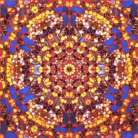
Cathedral, Duomo
Cathedral, Duomo
Signed Print
Damien Hirst
£13,000-£20,000
$26,000-$40,000 Value Indicator
$24,000-$35,000 Value Indicator
¥120,000-¥190,000 Value Indicator
€15,000-€23,000 Value Indicator
$130,000-$210,000 Value Indicator
¥2,700,000-¥4,150,000 Value Indicator
$17,000-$27,000 Value Indicator
There aren't enough data points on this work for a comprehensive result. Please speak to a specialist by making an enquiry.
120 x 120cm, Edition of 50, Screenprint
Auction Results

Track auction value trend
Meaning & Analysis
Cathedral, Duomo is a screen print from Damien Hirst’s 2007 Cathedral series that shows a brightly coloured, kaleidoscopic composition. Made up of carefully arranged butterfly wings, this print is symmetrical in form and radiates with colours of red, blue, orange and yellow.
The prints in the Cathedral series directly reference stained-glass windows in their complex, geometric patterns and are reminiscent of Hirst’s famous ‘Kaleidoscope paintings’ that can be located throughout his career, the first from 2001 titled It’s A Wonderful World. The Cathedral series can most obviously be compared to Hirst’s Superstition series (2006), a series of kaleidoscopic paintings that take their form as pointed arch shaped canvas, mimicking the windows in a cathedral. In their beauty and precision, obscuring the wings of butterflies into an abstract pattern, Cathedral, Duomo synthesises Hirst’s fascination with the intersection between religion, aesthetics and science that govern humanity.
For Hirst, the butterfly is a ‘universal trigger’ that many people share in finding attractive and joyous. Recalling someone once saying to him: “Butterflies are beautiful, but it’s a shame they have disgusting hairy bodies in the middle,” Hirst in works like this chose only to display the dazzling wings of the insect. Across the series, the butterfly wing is rendered unrecognisable when viewed at a distance and as part of the larger intricate pattern.
